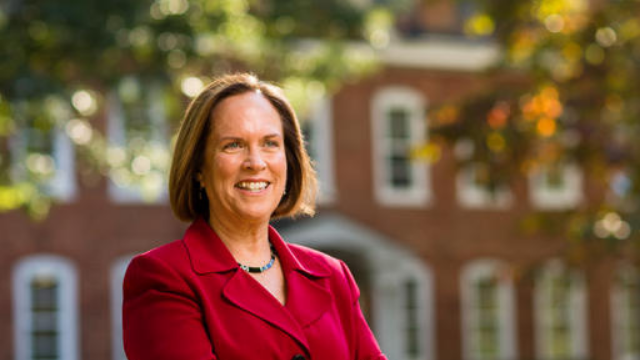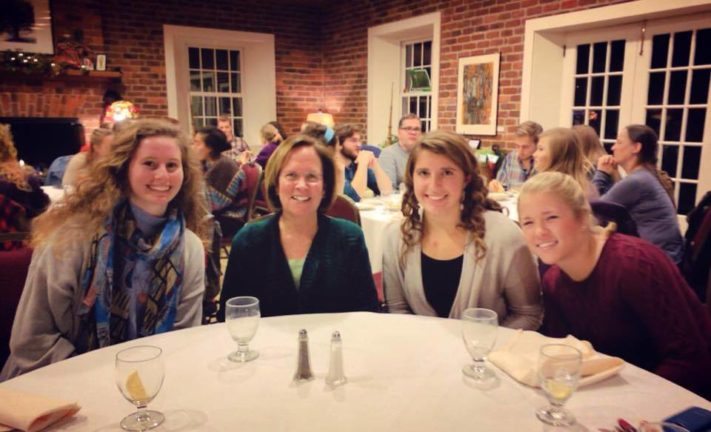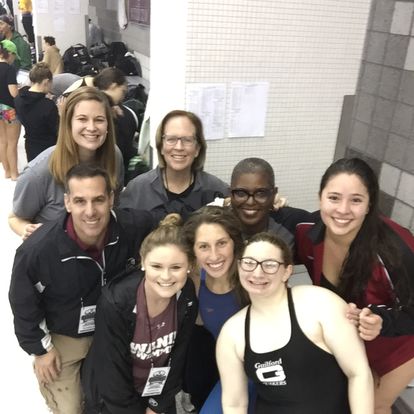
This interview with Jane Fernandes is a part of our Quakers in Education series. It follows our earlier conversations with Terry Nance I & II, Sa’ed Atshan, Maurice Eldridge, and Sarah Willie-LeBreton.
Jane Fernandes served as the president of Guilford College for seven years and is the newly appointed President of Antioch College in Yellow Springs, Ohio. She is the first deaf woman to lead an American college or university. She continues her role as a professor of English at Guilford.
Before joining Guilford College, Jane was a part of the University of North Carolina at Asheville, where she had been provost and vice-chancellor of academic affairs for six years. In addition, she served as vice president and later provost of Gallaudet University for a total of eleven years. Gallaudet University is a Washington, D.C., school that educates people who are deaf or hard of hearing.
Q: You have had a remarkably interesting and varied career in academics, deaf education leadership, and Quaker College leadership, plus you are a Quaker, right? Could you name how these interests and vocations intersect?
When I was a young girl, my deaf mother sent me to a local drug store to buy something without anyone finding out I was deaf. You see, my mother believed that being able to behave as hearing would keep me safe. Certainly, a general bias against deafness gave her good reason to attempt to hide my deafness. And she did not know about alternatives. So I was a young woman before I discovered signing, and an entire universe of expression opened to me. I didn’t know it, but before I learned to sign I was impoverished. I lived deprived of a richness and depth of communication that fit my use of vision in the absence of hearing. Trying to pass as hearing had kept me impoverished in my spirit, strength, and vitality.
In one way or another, don’t we all do this? We hide our disabilities and imperfections–when we can learn so much more about ourselves and others if we don’t hide them. Impoverished communities and institutions are those in which everyone attempts to look alike and think alike. We learn more about ourselves in a rich environment that is open to everyone.
Leading Guilford, a Quaker College, was a privilege because of its commitment to diversity. Aiming always to include and respect all voices, it is a special place in which we strive to assure that everyone has all options open to them. For our students, our academic communities, and ourselves, we must make certain no one is so defined by their circumstances that they don’t have all the options that will help them to thrive and help us address local and global problems. Guilford students want to realize every bit of their potential and change the space of the college itself for the better. For these reasons, Guilford is a place where my values and vocation intersected.
My lived experience of inclusion and respect made an impact on me in one more important way. I became a Quaker. While serving as president of Guilford College, my husband Jim and I attended Friendship Friends Meeting. The Meeting gathered a clearness committee for each of us, and we were led to become Friends by convincement. In Quakerism, I feel being deaf is not a loss or an inadequacy as it is seen by other religions. Silence is an important part of being a Quaker, and this is the state into which I was born. I value what silence has taught me, and I feel sustained by a community that also values what silence offers.

Q: As an advocate for DEI and a person who was born deaf and raised speaking, what are some of the issues all Friends should consider in terms of making their meetings welcoming to Friends who are deaf, as well as to all seekers?
Let’s think of a Quaker meeting for worship as a dinner table. Using this analogy, diversity occurs when, after our family sits down and starts eating, some friends knock at the door, and after opening it, we invite them to stay. When we make space for them, they sit with us. Maybe the table is not big enough to accommodate them, and we use old plates because we don’t have enough of the good ones. Still, we fit them in. How we do that is key.
Inclusion means we set the table and place settings for everyone who needs to be there. Equity occurs when people sit down and everyone has their needs met, even if it means some people have “more” than others to reach it, or we have to change our habits and customs.
To welcome deaf and hard of hearing people who are Quakers or seekers, remote Quaker meetings could provide captions as part of the meeting platform. I now attend the Asheville Friends Meeting remotely where captions are provided routinely without my having to ask. I know that Friendship Friends and Pendle Hill provide captions for meetings and worship. Captions can benefit many kinds of people, in addition to deaf and hard of hearing people, such as older people with hearing loss or people learning English as a second language.
Beyond captioning, meetings might consider providing Sign Language-English interpreters upon request. Not all deaf people can or want to read English captions, so at times interpreters are necessary to allow equitable access. In the past, Jim has provided interpreting for me at Quaker meetings. But it would be better not to rely on the services of someone who won’t be able to participate fully when interpreting.
Many people have little awareness of the Society of Friends. They may pass by a Meetinghouse without even knowing what happens there. Deaf people who are Quakers or seekers would benefit from messages on a Meeting webpage or from publicly visible signage saying, “You are welcome here.” An open-house meeting once a month might be an excellent way to lead deaf and hard of hearing people more clearly to the spiritual home they long for.
You mentioned that I was born deaf and raised speaking. It is important to identify me as a deaf person with speaking privilege, a privilege that many deaf people do not have. My mother’s speech teacher taught me speech from infancy and I had tutors who followed her. While English is my first language, because it is the language used in my home and school, I did not learn it naturally. Home teachers and tutors taught me very deliberately at every step and my deaf mother supported them and me. While I have been profoundly deaf since birth, speaking has allowed me to cross between deaf and hearing worlds, and my life has been a journey between and among people of difference as I have sought to create inclusive communities of academic excellence.
Q: You have spoken about the theme of silence as part of worship, can you tell us how that impacts you personally? What kind of worship feels most sustaining to you?
Unprogrammed worship such as that which occurs at Friendship Friends Meeting and Asheville Friends Meeting is the most sustaining kind of worship for me. While captioning and interpreting provide information, they are another layer to overcome or get through as we let our Inward Light shine and reflect that of God within us. Quaker silent worship allows me to be authentic. The spiritual gifts of a deaf person living in silence surrounded by a Quaker meeting full of people in silence, all seeking God together–I cannot think of a more authentic and meaningful way to worship.
I recommend the book Quaker Strongholds by Caroline Emilia Steven, a Quaker by convincement, who wrote, “Everything that does not add, subtracts.” The silence of Quaker worship is everything we need it to be. In the absence of sound, we worship abundantly and this carries into how we live our lives. I carry that phrase with me.
Q: How did you navigate career impediments to deafness? Were there moments when you felt frustrated? How did you work through those moments as a female academic and person with a hearing impediment?
I do not think of being deaf as an impediment. Deafness is a natural part of being human; humans exist on a spectrum from hearing to hard of hearing to deaf, and though deaf people form a low incidence community, we are a part of life. Being deaf is one of my human attributes, though sometimes I am frustrated because of both physical and attitudinal access barriers. If we understood the concept of inclusion, ecosystems where every living being provides connections to other living beings, we would always be prepared to welcome deaf and hard of hearing people by altering the environment to accommodate them rather than expecting them to fit in.
Dominated by hearing men unpracticed in inclusion, higher education has challenged me as a deaf academic woman. I have been mocked, jeered at, and mischaracterized because I process information differently and sometimes more carefully than hearing people. It is especially challenging when I am in a group of higher education professionals where I am the only deaf person to know when to take a turn in a discussion. Even as a College president, I have felt silenced by norms that guide hearing academic discussions. We deaf people have a saying, “Hearing people take turns; deaf people give turns.”
Perhaps the most painful moment of my career occurred at Gallaudet University when I was labeled “not deaf enough” to lead the University. Being “not deaf enough” refers to not having grown up signing and socializing with other deaf people. My interacting with deaf people and acquiring signing much later in life than most deaf people became the decisive factor in who would be the Gallaudet president. It was an example of discrimination and exclusion, albeit from the other side–not hearing people unable to open to a deaf leader, but deaf people in reactive exclusion of one of their own.

Q: Guilford has been through two tough years. How could Friends help? What are the issues the college has responded to? What will require ongoing work?
Guilford College, like many small liberal arts colleges, has had enrollment challenges leading to financial challenges. To build enrollment the Guilford community created the Guilford Edge, born out of a commitment to diversity, equity, inclusion, and access for all students. This commitment is so important not only to me but also to the long-term viability of any higher education institution. We crafted the Edge to have several outcomes predicting an enrollment increase:
- A new calendar allowing all students greater access to the financial resources necessary for internships, study away/abroad, and undergraduate research in new 3-week terms.
- A new program of professional advisers to focus more sharply on how students’ learning prepares them for careers.
- A new curriculum of metacognition to support the academic, personal, and professional goals of each student.
- A recommitment to a calendar of events and programming fostering a richer sense that everyone belongs to our community.
The Guilford Edge led to a turnaround of traditional student enrollment in a highly competitive market. New students increased by 8%, continuing students increased by 6%. Equally important, students getting grades of D, F or W decreased by 75%, and average GPAs increased by 10%. The attraction of the Edge and these improvements in academic progress resulted in more students enrolling and staying at Guilford College. A total of 65 students enrolled who would not otherwise have been, providing over $1 million in immediate, additional revenue.
When the global health and financial crises hit higher education, however, they hit Guilford and our already stretched finances hard. For the past two years, Guilford has cut spending to align with revenues. The College will have to continue this balancing act as it seeks to define new programs or modify existing programs to draw more students to the school.
I have no doubt that Guilford College will continue to call upon its Quaker heritage to respond authentically to challenges of enrollment and funding.
Q. How do you feel Friends could be helpful?
Friends can help by holding the College in the Light, encouraging Quaker students and seekers from all walks of life to consider Guilford as their college of choice, and sending donations and gifts. Friends can strengthen morale by praising the work done by everyone on campus over the past years to create the Guilford Edge and expressing confidence that this path can still deliver the enrollment they seek, even as they contend with post-pandemic challenges.
Friends also may be interested in supporting scholarships awarded to students who become Quaker Leadership Scholars and in funding the work of the William R. Rogers Friends Center and Quaker Studies. As you are a vital resource to the College, I am sure the campus community will welcome suggestions and offerings (of support).